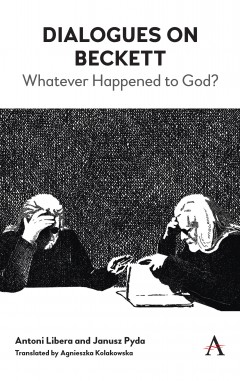Dialogues on Beckett
Whatever Happened to God?
By Antoni Libera & Janusz Pyda
Translated by Agnieszka Kolakowska
Other Formats Available:
E-Book- About This Book
- Reviews
- Author Information
- Series
- Table of Contents
- Links
- Podcasts
About This Book
‘Dialogues on Beckett’ is a collection of 12 conversations about 12 plays by Samuel Beckett, discussions about the meaning of life and the universe between an agnostic and a Christian, based on a close reading of the text. It includes a judicious balance of basic information about Beckett’s life and work, brief sketches of some interpretations of his plays and a few words on the critical reception of each, and sets out some possible criticisms of the vision of the world expressed in them. These last are particularly interesting given the many references and allusions to Christian theology to be found in the plays. They are, admittedly, heavily ironic, but they testify to the importance in Beckett’s thought of the Christian vision of the universe and the eschatological dimension of human existence.
Beckett, through the radicalism of his thought and his crystalline and very distinctive style, succeeds better perhaps than anyone else in getting at the heart of the disquiet which has marked our age, and he identifies its cause as a metaphysical transformation which is taking place before our eyes. That transformation is the disenchantment of the world. A number of factors have contributed to it; the progress of science is just one among many. But whatever the causes, the sphere of the sacred has lost its power and can no longer explain the course of history. The temple lies in ruins and we have found nothing to supplant it, no new way of making sense of the world and our place in the universe. Western Man has lost his bearings and can see no way forward; beyond the ancient and familiar paths of the Judeo-Christian tradition, increasingly difficult now to return to, lies unknown territory, empty and dark and cold. This state of suspension and disorientation gives rise to a profound disquiet, though we may not always be aware of its nature or its source. [NP] An analysis of Samuel Beckett’s major plays is an excellent introduction to a broader debate not only on the current state of Western culture and civilization but also, more generally, on the spiritual condition of modern man. The dialogues presented in this volume will inspire readers to reflect on these issues and encourage such a debate.
Reviews
Author Information
Antoni Libera is a writer, translator and stage director. Among his translations into Polish are all of Samuel Beckett’s plays and much of his prose. He has also directed many of Beckett’s plays, both in Poland and abroad, and has presented them at various international theatre festivals.
Janusz Pyda OP is a Dominican friar and lecturer in philosophy and theology at the Polish Dominican College of Philosophy and Theology.
Series
Anthem Studies in Theatre and Performance
Table of Contents
Authors’ Note, Samuel Beckett – The Last Literary Giant; Dialogue I: Messianism: Pros and Cons, ‘Waiting for Godot’ (1949); Dialogue II: The Tyranny of the Emancipated Mind, ‘Endgame’ (1956); Dialogue III: The Fiasco of Self-Creation, ‘Krapp’s Last Tape’ (1958); Dialogue IV: Incorrigible Optimism, ‘Happy Days’ (1961); Dialogue V: The Comic Side of Pessimism, ‘Rough for Theatre II’ (Late 1950s); Dialogue VI: Life as Purgatory, ‘Play’ (1962); Dialogue VII: Darkness and Forms of Speech, ‘Not I’ (1972); Dialogue VIII: Inventing Oneself, ‘That Time’ (1974); Dialogue IX: Life without a Father, ‘Footfalls’ (1975); Dialogue X: Creatures of the Night, ‘… But the Clouds …’ (1976); Dialogue XI: The Abyss of the Unconscious, ‘Ohio Impromptu’ (1981); Dialogue XII: Catastrophe with No Tragedy, ‘Catastrophe’ (1982).
Links
Stay Updated
Information
Latest Tweets



